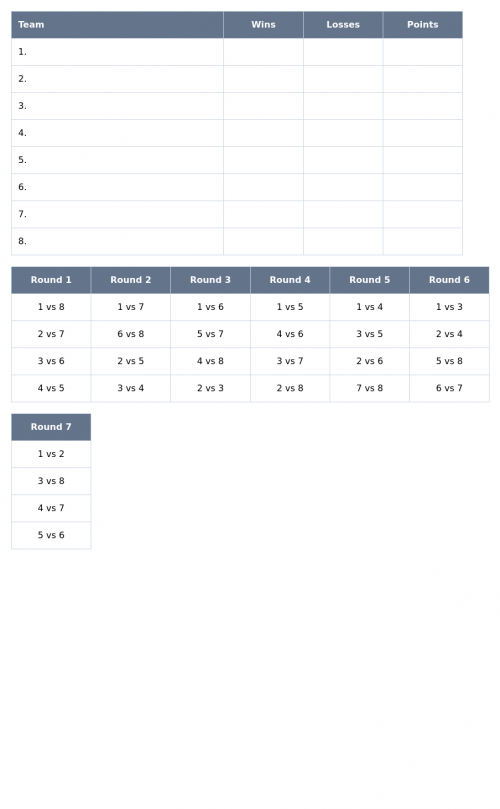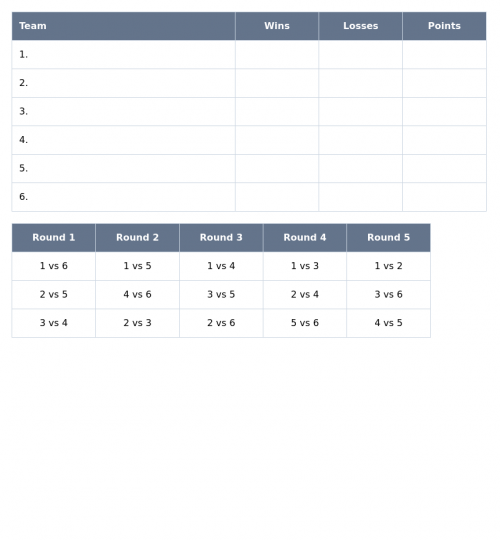What is a Round Robin Tournament?
It’s a tournament scheduling format where competitors play against each other once or twice (aka double round robin). It’s also known as “king of the court” or “queen of the court”. Beyond traditional organization methods, you can now use our round robin builder to streamline the process.
Round robin tournaments can be played individually or in teams (e.g. in 6 teams). Unlike knockout (or elimination) format, in round robin everyone plays with everyone to ensure fairness. To test different scenarios before your tournament, you can use our round robin simulator.
Popular Types
Depending on the sport, there might be one or two rounds for opponent teams or players. Using a round robin schedule maker can help you plan the optimal format.
Single Round Robin
In a single round robin, each participant faces every other participant once. This format is straightforward and less time-consuming than its double counterpart. Our round robin tool can help manage the scheduling process.
Double Round Robin
Double round robin tournaments require each participant to play against every other participant twice, once at home and once away, often seen in sports leagues like football and basketball. A round robin matchup generator can help optimize these pairings.
Switch Doubles Round Robin
In this variation, players pair up with each other once and play against other pairs, but collect points individually. The round robin schedule creator can help manage partner rotations efficiently.
Other variations
There are specific variations of round robin format in sports like pickleball, padel & tennis.
For instance, below are popular padel tournament formats to play in country clubs and among friends:
- Americano: basically, it’s a classic switch doubles round robin format where players collect point individually. Our round robin draw generator can create optimal brackets for this format.
- Mixed americano: same as above, but players are divided into mixed-gender teams (M1+F1 vs M2+F2); this format requires equal number of male and female players
- Team americano: works with existing teams. Use our round robin randomizer to create fair initial matchups.
- Mexicano & Mixicano: the key difference is that teams are repaired after each round based on the current leaderboard; the repairing logic depends on whether you have mixed-gender teams, and on the repairing rules of the tournament
Advantages
- Fairness: round robin tournaments provide a level playing field, as each participant competes against all others, reducing the chance of luck affecting the outcome.
- Comprehensive skill assessment: since everyone plays against each other, the final standings reflect a true measure of each participant’s abilities and performance.
- Audience engagement: these tournaments can be highly engaging for audiences, as they get to see multiple matchups and enjoy more content.
- Advanced tracking: using a round robin chart generator, organizers can visualize progress and standings throughout the tournament.
Disadvantages
- Time-consuming: due to the number of matches required, round robin tournaments can take a long time to complete, which may not be practical for all events; for example, for 4 teams there will be 6 games, for 5 teams — 10, for 6 teams — 15, for 7 teams — 21 games, but for for 16 teams there will be 120 games!
- Resource intensive: organizing such tournaments requires significant resources in terms of venues, scheduling, and management.
- Potential for predictable outcomes: if one participant is vastly superior, the outcomes can become predictable, reducing excitement.
How Round Robin Tournaments Work
Players and Matches
In a classic round robin tournament, each participant plays against every other participant at least once. In case of playing in doubles, each player will play with every other player once. Using a comprehensive round robin point system, all players have the same opportunity to earn points during the tournament.

This structure contrasts sharply with knockout tournaments, where a single loss results in elimination. To better understand the differences, you can use our round robin simulator to compare various tournament formats.
Scoring
Participants earn points for wins, draws, and losses. Typically, a win awards 3 points, a draw (or tie) 1 point, and a loss 0 points. The round robin chart generator helps track and visualize these scores throughout the tournament.
In some sports like Padel or Pickleball, each match lasts until a predefined number of points (e.g. 20, 24, or 32). Each point won gives respective player a point. For instance, if P1 and P2 won the match with P3 and P4 with 20-12, P1 and P2 each gets 20 points, and P3 and P4 — 12 points.
Rankings
Players are ranked based on the amount of points they earned during the tournament. Player with the highest number of points is considered a winner. Our round robin tool provides real-time ranking updates and statistics.
How to Organize Round Robin Tournament
For starters, you would need to find a least 3 players for a round robin tournament. Using our round robin schedule maker can help streamline the organization process.
Step-by-Step Guide
The tournament schedule normally looks like this:
- The organizer signs up players or teams, and decides what variation of the round robin format they will play: single, double, etc. The round robin builder can help customize the perfect format for your needs.
- If it’s team play, and there are no teams yet, use the round robin matchup generator to arrange teams according to the format so that every team plays with every other team at least once
- After that, the first round is played
- The consequent rounds depend on the format again: in the classic round robin, all rounds can be arranged from the start using the round robin draw generator, while in some variations the next round will get formed after the current one is finished
- Once all the games are played, the winner is determined based on the amount of points
Software
Making sure every player gets to play the same amount of games, keeping track of points, managing courts, etc. All these things take a lot of time of the organizer. Our free tournament management Brackets app takes care of it, leaving you and your friends more time to enjoy the game. The round robin schedule creator helps automate many of these tasks.
Round Robin vs. Knockout (Elimination) Tournaments
Key Differences
Round robin tournaments focus on fairness and comprehensive competition, while knockout tournaments emphasize excitement and quick results. Using a round robin randomizer ensures fair initial matchups, while the round robin point system provides comprehensive performance tracking throughout the tournament.
When to Use Each Format
Round robin is ideal for skill assessment and ensuring all participants get ample playtime, whereas knockout is perfect for high-stakes, fast-paced competitions. Our round robin simulator can help you determine which format best suits your needs.














